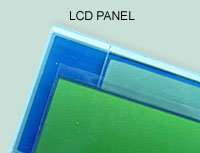| LCD BASIC TECHNOLOGY Liquid crystal displays (LCDs) are a passive display technology. This means they do not emit light nor any radiation; instead, they use the ambient light in the environment.
When it's "on", voltage is applied and the LC molecules align themselves in the direction of the electric field. This causes the light to be out of phase with the polarizers and to be blocked, creating a dark area on the LCD. By selectively applying voltage to the electrodes, a variety of patterns can be achieved. Many advances in TN LCDs have been produced. Super twisted nematic (STN) LC material offers a higher twist angle (240 vs. 90) that provides higher contrast and a better viewing angle. However, one negative feature is the birefringence effect, which shifts the background color to yellow-green and the character color to blue. This background color can be changed to a gray by using a special filter. The most recent advance has been the introduction of film super twisted nematic (FSTN) displays. This adds a retardation film to the STN display that compensates for the color added by the birefringence effect. This allows a black and white display to be produced. Because of the added filtering, FSTN displays look best when used with a backlight. |
|
| Glossary | LCD Module | LCD Panel | Backlight | IC | Top |
 By
manipulating this light, they display images using very little power.
This has made LCDs the preferred technology whenever low power consumption
and compact size are critical. Liquid crystal (KLC) is an organic
substance that has both a liquid form and a crystal molecular structure.
The rod-shaped molecules are normally in a parallel array, and an
electric field can be used to control the molecules. Most LCDs today
use a type of liquid crystal called twisted nematic (TN) . LCDs
consist of two pieces of glass with transparent electrodes printed
on the internal surfaces. An alignment layer on each glass surface
is used to twist the liquid crystal material in a helical or "twisted"
pattern. Polarizers are used on the outside front and rear surfaces.
When the LCD is "off", no voltage is applied to the electrodes,
and light passes through the LCD.
By
manipulating this light, they display images using very little power.
This has made LCDs the preferred technology whenever low power consumption
and compact size are critical. Liquid crystal (KLC) is an organic
substance that has both a liquid form and a crystal molecular structure.
The rod-shaped molecules are normally in a parallel array, and an
electric field can be used to control the molecules. Most LCDs today
use a type of liquid crystal called twisted nematic (TN) . LCDs
consist of two pieces of glass with transparent electrodes printed
on the internal surfaces. An alignment layer on each glass surface
is used to twist the liquid crystal material in a helical or "twisted"
pattern. Polarizers are used on the outside front and rear surfaces.
When the LCD is "off", no voltage is applied to the electrodes,
and light passes through the LCD.